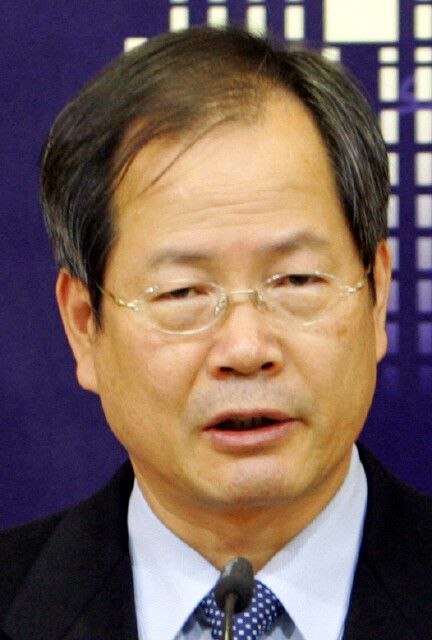hankyoreh
Links to other country sites 다른 나라 사이트 링크
[Interview] The Park Geun-hye administration’s biggest national defense mistake

Korean Peninsula Future Forum Chairman Chun Yung-woo said in an interview with the Hankyoreh on June 21, “The biggest strategic mistake made by the Park Geun-hye administration in terms of national security and defense was the postponement of the transfer of wartime operational control [OPCON] to us. The Lee Myung-bak government had fully prepared so that the new administration could carry out the transfer of OPCON in 2015 as scheduled.”
Chun was a conservative who served as senior secretary to the president for foreign affairs and national security during the Lee Myung-bak administration (2008-13). He further emphasized, “At the time, I could not understand why there was a delay or who the president was listening to that would cause her to make such an erratic decision. In view of our economic and military power, there is absolutely no reason to leave wartime operational control in the hands of the US.”
As part of its promise to carry out the OPCON transfer by December 2015, the government prepared a collaborative command system in which the commander of US Forces Korea would participate as deputy commander and create a combined South Korea-US division.
In addition to violating her own election pledge, Park’s independent postponement of the OPCON transfer also resulted in the de facto cancellation of the previous administration’s Yongsan Relocation Plan (YPR) and Land Partnership Plan (LPP), which had been ratified by the National Assembly. At the time, the administration cited “a changing security environment, including the North Korean nuclear and missile threat” as its reason.
“While I was senior secretary, it wasn’t a situation where people like [Blue House] National Security Office chief Kim Kwan-jin, who thought we could go ahead with the transfer, could change [the determination],” Chun recalled.
“None of [the OPCON transfer advocates] believed North Korea wasn‘t going to do a nuclear test. They prepared for the OPCON return on the assumption that would happen,” he argued.
President Lee Myung-bak also postponed the OPCON transfer in 2010, carrying out his pledge as a candidate to push the transfer data back three years and eight months from the Roh Moo-hyun administration’s (2003-08) date of Apr. 2012. The main reasons, Lee would write in his autobiography “The President’s Time,” were “North Korea’s nuclear development and the ROKS Cheonan warship sinking.”
In 1994, the Kim Young-sam administration took over peacetime OPCON for South Korea despite the beginnings of the first North Korean nuclear crisis and threats from Pyongyang about Seoul being turned into a “sea of fire.” North Korean nuclear tests were treated as a constant in later discussions of the OPCON return. In 2006, Roh reached the first OPCON transfer agreement with then-US President George W. Bush. At the time, current Korea National Strategy Institute director Kim Chang-soo was an administrative official for the National Security Council (NSC).
“USFK Commander Burwell Bell said the South Korean military‘s operational execution capabilities were outstanding and the transfer could certainly happen by 2009, but [the administration] set the 2012 date as a maximum after receiving an opinion from the Ministry of National Defense,” Kim recalled.
When asked whether the OPCON transfer could take place right now, Chun replied, “I think the sooner the better.”
“Military readiness posture capabilities will never be exactly at the desired level. Rather than the problems that arise from handing over operational control at a time like that, the bigger problems are the weakened sense of ownership and responsibility from the military and moral hazard when you don’t,” he said.
“Our letting the US take the wheel every time while we ride shotgun just because it’s a good driver is making a mess of national security.”
By Im In-tack, staff reporter
Please direct questions or comments to [english@hani.co.kr]

Editorial・opinion
![[Column] The state is back — but is it in business? [Column] The state is back — but is it in business?](https://flexible.img.hani.co.kr/flexible/normal/500/300/imgdb/original/2024/0506/8217149564092725.jpg) [Column] The state is back — but is it in business?
[Column] The state is back — but is it in business?![[Column] Life on our Trisolaris [Column] Life on our Trisolaris](https://flexible.img.hani.co.kr/flexible/normal/500/300/imgdb/original/2024/0505/4817148682278544.jpg) [Column] Life on our Trisolaris
[Column] Life on our Trisolaris- [Editorial] Penalties for airing allegations against Korea’s first lady endanger free press
- [Editorial] Yoon must halt procurement of SM-3 interceptor missiles
- [Guest essay] Maybe Korea’s rapid population decline is an opportunity, not a crisis
- [Column] Can Yoon steer diplomacy with Russia, China back on track?
- [Column] Season 2 of special prosecutor probe may be coming to Korea soon
- [Column] Park Geun-hye déjà vu in Yoon Suk-yeol
- [Editorial] New weight of N. Korea’s nuclear threats makes dialogue all the more urgent
- [Guest essay] The real reason Korea’s new right wants to dub Rhee a founding father
Most viewed articles
- 1[Column] Why Korea’s hard right is fated to lose
- 2Amid US-China clash, Korea must remember its failures in the 19th century, advises scholar
- 3[Column] The state is back — but is it in business?
- 460% of young Koreans see no need to have kids after marriage
- 5Presidential office warns of veto in response to opposition passing special counsel probe act
- 6Japan says it’s not pressuring Naver to sell Line, but Korean insiders say otherwise
- 7[Editorial] Stagnant youth employment poses serious issues for Korea’s future
- 8[Guest essay] Maybe Korea’s rapid population decline is an opportunity, not a crisis
- 9OECD upgrades Korea’s growth forecast from 2.2% to 2.6%
- 10Hybe-Ador dispute shines light on pervasive issues behind K-pop’s tidy facade